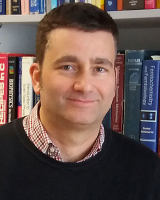back to staff
Transcriptomics and proteomics play important roles in food systems, underpinning at a molecular level the development of the chemical components and enzymatic reactions that determine the sensory and nutritional properties of foods. Biotic and abiotic processes strongly influence the chemical composition of plants and derived foods, but these changes are mediated by, and reflected in the transcriptomes and proteomes of cells. At the same time, the ways humans respond to the sensory and nutritional properties of food components are also determined by genetic factors, making transcriptomics and proteomics important tools to understand the effect of the chemical composition of foods on human physiology. We use chemical and molecular biology approaches to develop high-throughput approaches to study transcriptomics and proteomics, with a particular emphasis on high-resolution spatial analysis. Our goal is to understand, at the most fundamental level, the origin, development and physiological consequences of the molecular food constituents.
| 2019 – Current | Group leader “Transcriptomics and proteomics chemistry” at the Leibniz-Institute for Food Systems Biology at the Technical University of Munich |
| 2019 – Current | Group leader “Nucleic Acid and Bioanalytical Chemistry” at the Chair of Food Chemistry and Molecular Sensory Science, TUM School of Life Sciences Weihenstephan, Technical University of Munich |
| 2016 – Current | Associate Professor, Faculty of Chemistry, University of Vienna |
| 2012 – 2016 | Assistant Professor (tenure track), Faculty of Chemistry, University of Vienna |
| 2009 – 2012 | Contract Professor, Faculty of Chemistry, University of Vienna |
| 2008 – 2009 | Postdoctoral Researcher, Center for Nanotechnology, Electrical and Computer Engineering Department, Genetics/Biotechnology Center, University of Wisconsin–Madison. |
| 2003 – 2007 | Postdoctoral Researcher, Physics Department, Technical University of Munich |
| 2002 – 2003 | Postdoctoral Researcher, Chemistry Department, Technical University of Munich |
| 1997 – 2002 | PhD in Physical Chemistry, University of South Carolina–Columbia |
| 1996 | Master of Science in Physics, University of Michigan–Ann Arbor |
| 2017 – 2023 | FWF Austrian Science Fund Stand-alone Project (P 30596): “Ribosomal Synthesis of High-Density Peptide Microarrays & Modified mRNA Applications” €392,000. |
| 2015 – 2018 | FWF Austrian Science Fund Stand-alone Project (P 27275): “Enzymatic Synthesis of High-Density RNA Microarrays and RNA Aptamer Applications” €313 000. |
| 2012 – 2016 | FWF Austrian Science Fund Stand-alone Project (P 23797): “Synthesis of High Density RNA Microarrays” €337 000. |
| 2011 – Current | Lecture and seminar: “Scientific Writing”, University of Vienna, Technical University of Munich |
| 2012 – Current | Practical course: “Biotechnology”, University of Vienna |
| 2013 – 2020 | Lecture: Computer-assisted literature research for natural scientists”, University of Vienna |
| 2013 – 2020 | Practical exercises: Computer-assisted literature research for natural scientists”, University of Vienna |
| 2011 – 2012 | Seminar “Molecular Bioanalytics”, University of Vienna |
| 2010 – 2014 | Seminar “Oligonucleotide Microarray Synthesis and Technology”, University of Vienna |
| 2011 – 2017 | Seminar “Chemistry Journal Club”, University of Vienna |
(See ORCID for complete list)
V. Stoeger, A.-K. Holik, K. Hölz, T. Dingjan, J. Hans, J. P. Ley, G. E. Krammer, M. Y. Niv, M. M. Somoza, V. Somoza (2020) Bitter-tasting amino acids L-arginine and L-isoleucine differentially regulate proton secretion via T2R1 signaling in human parietal cells in culture. Journal of Agricultural and Food Chemistry, 68, 11, 3434.
P. Antkowiak, J. Lietard, M.Z. Darestani, M.M. Somoza, W. Stark, R. Heckel, R. Grass (2020) Low Cost DNA Data Storage Using Photolithographic Synthesis and Advanced Information Reconstruction and Error Correction. Nature Communications 11, 5345.
K. Hölz, E. Schaudy, J. Lietard, M. M. Somoza (2019) Multi-Level Patterning Nucleic Acid Photolithography, Nature Communications 10, 3805.
J. Lietard, D. Ameur, M. Damha, M. M. Somoza (2018) High-Density RNA Microarrays Synthesized in situ by Photolithography. Angewandte Chemie International Edition, 57, 15257.
K. I. Liszt, J. P. Ley, B. Lieder, V. Stöger, C. M. Hochkogler, E. Köck, M. Behrens, A. Marchoni, A. Reiner, J. Hans, G. Krammer, W. Meyerhof, M. M. Somoza, V. Somoza (2017) Caffeine induces gastric acid secretion via bitter taste signaling in gastric parietal cells. Proceedings of the National Academy of Sciences 114(30) E6260.
J. Lietard, H. Abou Assi, I. Gómez-Pinto, C. González, M. M. Somoza, M. Damha (2017) Binding Affinity Landscape of Thrombin on 2′-F-ANA/DNA Chimeric G-Quadruplex Aptamer Microarrays. Nucleic Acids Research 45(4) 1619.
N. Kretschy, A.-K. Holik, V. Somoza, K.-P. Stengele, M. M. Somoza (2015) Next Generation o-Nitrobenzyl Photolabile Groups for Light-Directed Chemistry and Microarray Synthesis. Angewandte Chemie International Edition 54(29), 8555.
C. Agbavwe, C. Kim, D. Hong, K. Heinrich, T. Wang and M. M. Somoza (2012) Efficiency, Error and Yield in Light-Directed Maskless Synthesis of DNA Microarrays. Journal of Nanobiotechnology 9(57).
J. Lackey, D. Mitra, M. M. Somoza, F. Cerrina, M. Damha (2009) Acetal Levulinyl Ester (ALE) Groups for 2'-Hydroxyl Protection of Ribonucleosides in the Synthesis of Oligoribonucleotides on Glass and Microarrays. Journal of the American Chemical Society, 131(24), 8496-8502; dx.doi.org/10.1021/ja9002074.
M. M. Somoza, D. Andreatta, C. J. Murphy, R. S. Coleman and M. A. Berg (2004) Effect of Lesions on the Dynamics of DNA on the Picosecond and Nanosecond Timescales Using a Polarity Sensitive Probe. Nucleic Acids Research 32, 2494.

